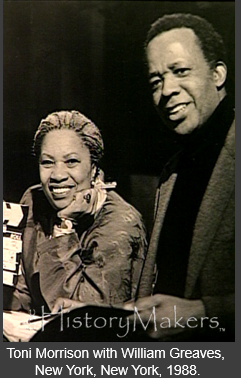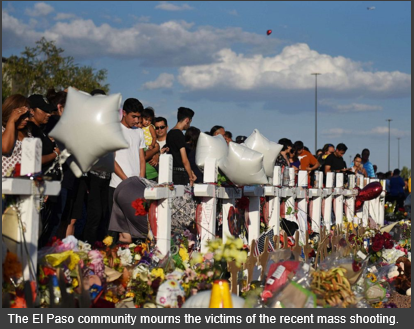Toni Morrison’s Death Amidst Violence - The HistoryMakers Newsletter - 8/9/19 (Used With Permission From The HistoryMakers)
Toni Morrison’s Death Amidst Violence - The HistoryMakers Newsletter
In the wake of devastating losses in the same weekend in El Paso, Texas and Dayton, Ohio, another tremendous loss followed on Monday, with the passing of the beloved Toni Morrison. Educator, publisher, author, and activist, Toni Morrison – winner of the Nobel Prize in Literature, the Pulitzer Prize, and the American Book Award – leaves behind an indisputable legacy of dedication to bringing the African American experience to light and creating an equal society. The killings in El Paso and Dayton stand in stark contrast to her life and death and remind us of how very segregated our society still is. These shootings are often born of a lack of understanding regarding another group of people, something Morrison sought to address. Before Patrick Crusius, 21, of Allen, Texas, entered that Walmart, he posted a 16,000 word document railing against Jews, and Mexicans in support of white nationalism. Connor Betts, 24, of Bellbrook, Ohio, had his agenda against women and previously threatened his high school classmates. Perhaps if people were to grow up in the more inclusive environment Morrison fought for, some of this fear and hatred would abate. As Morrison would have reminded us, “This is precisely the time when artists go to work. There is no time for despair, no place for self-pity, no need for silence, no room for fear. We speak, we write, we do language. That is how civilizations heal."

Morrison began teaching English at Howard University, where she quickly impacted countless students, including a fair share of HistoryMakers. Civic leader Wenda Weekes Moore certainly took note of Morrison’s brilliance, but did even more so after later reading one of her books: “The first time I read one of her books, I was like, I can't believe that this woman had these incredible stories running around in her head as she sat there reading our crazy little freshman compositions. It must have been torture for her.” However, in her role as an educator, Morrison knew the importance of equipping her students – including Kwame Ture (Stokely Carmichael), former Washington, D.C. Mayor The Honorable Sharon Pratt, and many others – with the knowledge and confidence to succeed in a country that was not designed to benefit African Americans. In her 2007 interview, Pratt recalled Morrison’s unique teaching style: “Class with Toni Morrison was also quite something because her compelling style that is reflected in her writings was evident in class…. She challenged old assumptions, and she did that in her lecture. And she did it in a way that the implications were that if you didn't begin to challenge these old assumptions, then you were intellectually lazy.” The idea of actively challenging established norms certainly resonated with many of her former pupils, and was amply reflected in her long career devoted to presenting a more accurate and human depiction of black life and culture to a readership that had been saturated with stereotypes and racism. Professor and artist Johnny Coleman remembers how central this was to her work: “I think that Toni Morrison is brilliant and she says that the reason she's working and what she sees as her mission as an artist, as a writer, is to imagine the interior lives of the ancestors.” Museum director and curator Thelma Golden noted the inspiration she draws from Morrison’s early life: “Nothing inspires me more than the idea of the fact that Toni Morrison got up before her children were awake, and sat down and wrote those early novels before getting them up, getting them off to school, and then going to her job as an editor. And I just find that example of work ethic and creativity, and life in the world, to be incredible and deeply a way that I try to model in my own life.”
While Morrison helped pave the way for more diversity in publishing, printing and promoting the works of Henry Dumas, Toni Cade Bambara, Angela Davis, and Gayl Jones, that path is still limited, and desperately needs to grow. In Publishers Weekly’s 2014 salary survey, it was discovered that only 1% of the publishing industry’s professionals identify as African American, with 89% being white. Furthermore, only 13% of books published for young readers between 1994 and 2017 contained multicultural content. Challenging the status quo is no easy task, and Morrison did just that her entire career, inspiring others to do the same. She told the New York Times in 1994, “I felt I represented a whole world of women who either were silenced or who never had received the imprimatur of the established literary world.” That one author bore the task of representing an entire generation of women goes to show how few were given the opportunity. Due to this lack of diversity, many Americans are raised with a limited understanding of lives different from their own.

Though known for her works in fiction, she has crafted thoughtful political commentary that will certainly provide us guidance even after she has gone. In light of the gun violence in El Paso and Dayton this past weekend, we can find some explanation through a piece she wrote in 2016 titled “Mourning for Whiteness”: “Under slave laws, the necessity for color rankings was obvious, but in America today, post-civil-rights legislation, white people’s conviction of their natural superiority is being lost. Rapidly lost. There are ‘people of color’ everywhere, threatening to erase this long-understood definition of America. And what then? Another black President? A predominantly black Senate? Three black Supreme Court Justices? The threat is frightening.” While many white people have let fear of change and the unknown overcome them, Morrison has remained collected and let her strengths in writing act as a tool with which she fought the centuries old fight for equality. Morrison’s passing is an opportunity to look back at her work towards increasing representation of African Americans in literature and publishing, as well as her perseverance against racism and hate. In looking back, there is, however, a clear reminder of the work that still must be done to build on the foundations she laid out for the next generation.
